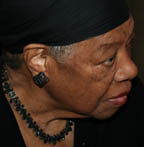 |
| Maya Angelou (DevotionReader Copyright 2009) |
Although I was reading the lines of those poems for the first time, the words were drumming a familiar beat in my chest as if someone were also speaking them from somewhere deep inside me. At the same time, I also thought someone was speaking the words behind me, and I even shifted a little to look over my shoulder. It was my Aunt Thelma that I heard saying those words, though she was nowhere nearby. Her talent for elocution was marked by her winsome ability to bend and stretch syllables, taking the listener on a rollercoaster ride of high and low pitches, punctuated by sharp endstops on words she spoke in emphasis. As long as what she had to say ended with everyone feeling in good spirits, listening to Aunt Thelma was a cautious delight when I was a child.
"The tales they tell sound just like lying" is a line from, "When I Think About Myself." I read the eight words intellectually, but in my head I heard Aunt Thelma perform them with attitude. I heard her draw out the word, "tales," in two or three beats longer than it routinely takes to speak that word, then at the end of the line her voiceover bleated out the words, "just like lying," in three overemphasized beats like James Brown's horn section at the end of a number. Aunt Thelma's personality, already submerged inside me, had taken over my reading of the poem. I knew it was her because I was too reserved as a teenager to show out like that.
I wondered, "did Maya Angelou know Aunt Thelma?" How could she have so faithfully transcribed Aunt Thelma's personal style into these poems?
Not too long after thinking intently about this, I realized that Maya Angelou was not transcribing just my aunt. Ms. Angelou had captured a certain personality, a certain cultural sensibility present in the Black community, especially as expressed by some women, and one that could be traced from the South, to the North to the West, and even across generations. And this was an important revelation for me because it was the first time I recognized that my family, the persons in my family, were part of a living and dynamic cultural fabric, and that by virtue of that connection, we, the Parker family, were not only an individual unit but in some way we typified and exemplified some of the traditions and cultural norms of Black Americans.
From that time on I read history and literature with an understanding that some of what I was reading about Black folks could be found in the stories or expressions of members of my family, and that I could learn some of these things by just by sitting around the kitchen table listening to my grandmother, my mother and my aunts talking. I felt connected to a society whose outlines I had not seen so clearly before, threads of my African American cultural heritage connected directly to my family. It was powerful; it gave me a sense of belonging. I felt that the commonality in my culture was an inheritance.
Since that time I have even more deeply valued the power of literature and history to contribute to learning about myself and my culture, and how I am linked with other African Americans and Black folks dynamically across the Diaspora. The history and literature also gives me a background and platform to discuss experiences with folks of other races, and from which to find understanding even if our experiences are different. That is what I gained when I found something that was familiar to my own life while reading a book.


I connected to this. Thank you
ReplyDelete